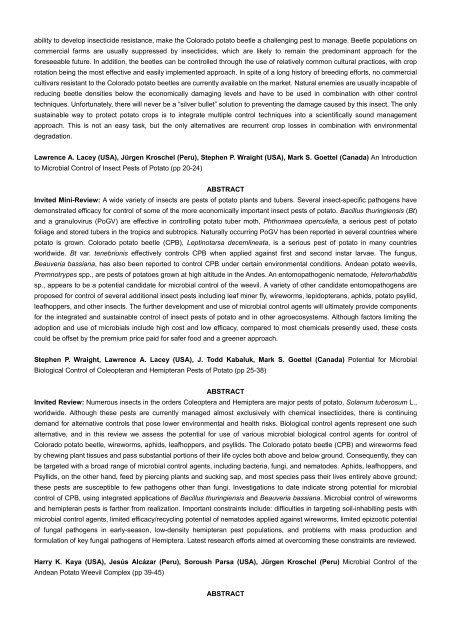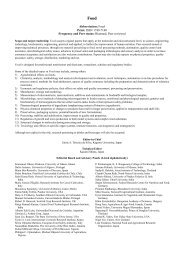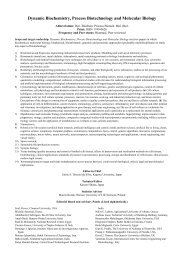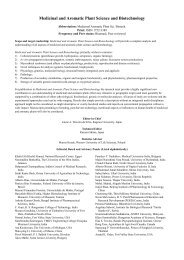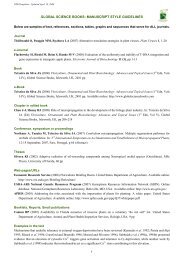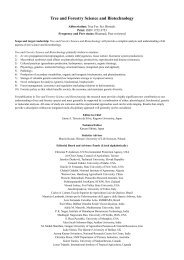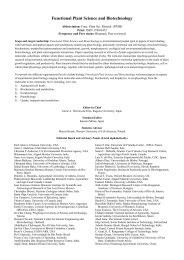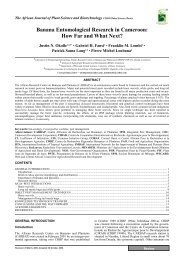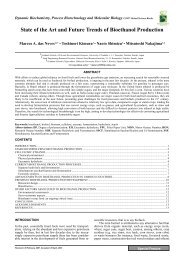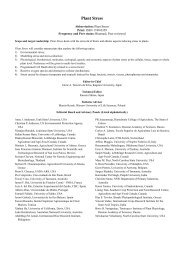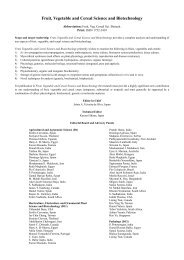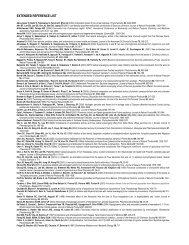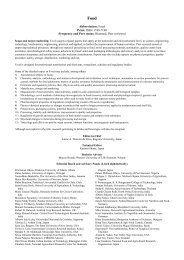Fruit, Vegetable and Cereal Science and Biotechnology
Fruit, Vegetable and Cereal Science and Biotechnology
Fruit, Vegetable and Cereal Science and Biotechnology
You also want an ePaper? Increase the reach of your titles
YUMPU automatically turns print PDFs into web optimized ePapers that Google loves.
ability to develop insecticide resistance, make the Colorado potato beetle a challenging pest to manage. Beetle populations on<br />
commercial farms are usually suppressed by insecticides, which are likely to remain the predominant approach for the<br />
foreseeable future. In addition, the beetles can be controlled through the use of relatively common cultural practices, with crop<br />
rotation being the most effective <strong>and</strong> easily implemented approach. In spite of a long history of breeding efforts, no commercial<br />
cultivars resistant to the Colorado potato beetles are currently available on the market. Natural enemies are usually incapable of<br />
reducing beetle densities below the economically damaging levels <strong>and</strong> have to be used in combination with other control<br />
techniques. Unfortunately, there will never be a “silver bullet” solution to preventing the damage caused by this insect. The only<br />
sustainable way to protect potato crops is to integrate multiple control techniques into a scientifically sound management<br />
approach. This is not an easy task, but the only alternatives are recurrent crop losses in combination with environmental<br />
degradation.<br />
Lawrence A. Lacey (USA), Jürgen Kroschel (Peru), Stephen P. Wraight (USA), Mark S. Goettel (Canada) An Introduction<br />
to Microbial Control of Insect Pests of Potato (pp 20-24)<br />
ABSTRACT<br />
Invited Mini-Review: A wide variety of insects are pests of potato plants <strong>and</strong> tubers. Several insect-specific pathogens have<br />
demonstrated efficacy for control of some of the more economically important insect pests of potato. Bacillus thuringiensis (Bt)<br />
<strong>and</strong> a granulovirus (PoGV) are effective in controlling potato tuber moth, Phthorimaea operculella, a serious pest of potato<br />
foliage <strong>and</strong> stored tubers in the tropics <strong>and</strong> subtropics. Naturally occurring PoGV has been reported in several countries where<br />
potato is grown. Colorado potato beetle (CPB), Leptinotarsa decemlineata, is a serious pest of potato in many countries<br />
worldwide. Bt var. tenebrionis effectively controls CPB when applied against first <strong>and</strong> second instar larvae. The fungus,<br />
Beauveria bassiana, has also been reported to control CPB under certain environmental conditions. Andean potato weevils,<br />
Premnotrypes spp., are pests of potatoes grown at high altitude in the Andes. An entomopathogenic nematode, Heterorhabditis<br />
sp., appears to be a potential c<strong>and</strong>idate for microbial control of the weevil. A variety of other c<strong>and</strong>idate entomopathogens are<br />
proposed for control of several additional insect pests including leaf miner fly, wireworms, lepidopterans, aphids, potato psyllid,<br />
leafhoppers, <strong>and</strong> other insects. The further development <strong>and</strong> use of microbial control agents will ultimately provide components<br />
for the integrated <strong>and</strong> sustainable control of insect pests of potato <strong>and</strong> in other agroecosystems. Although factors limiting the<br />
adoption <strong>and</strong> use of microbials include high cost <strong>and</strong> low efficacy, compared to most chemicals presently used, these costs<br />
could be offset by the premium price paid for safer food <strong>and</strong> a greener approach.<br />
Stephen P. Wraight, Lawrence A. Lacey (USA), J. Todd Kabaluk, Mark S. Goettel (Canada) Potential for Microbial<br />
Biological Control of Coleopteran <strong>and</strong> Hemipteran Pests of Potato (pp 25-38)<br />
ABSTRACT<br />
Invited Review: Numerous insects in the orders Coleoptera <strong>and</strong> Hemiptera are major pests of potato, Solanum tuberosum L.,<br />
worldwide. Although these pests are currently managed almost exclusively with chemical insecticides, there is continuing<br />
dem<strong>and</strong> for alternative controls that pose lower environmental <strong>and</strong> health risks. Biological control agents represent one such<br />
alternative, <strong>and</strong> in this review we assess the potential for use of various microbial biological control agents for control of<br />
Colorado potato beetle, wireworms, aphids, leafhoppers, <strong>and</strong> psyllids. The Colorado potato beetle (CPB) <strong>and</strong> wireworms feed<br />
by chewing plant tissues <strong>and</strong> pass substantial portions of their life cycles both above <strong>and</strong> below ground. Consequently, they can<br />
be targeted with a broad range of microbial control agents, including bacteria, fungi, <strong>and</strong> nematodes. Aphids, leafhoppers, <strong>and</strong><br />
Psyllids, on the other h<strong>and</strong>, feed by piercing plants <strong>and</strong> sucking sap, <strong>and</strong> most species pass their lives entirely above ground;<br />
these pests are susceptible to few pathogens other than fungi. Investigations to date indicate strong potential for microbial<br />
control of CPB, using integrated applications of Bacillus thuringiensis <strong>and</strong> Beauveria bassiana. Microbial control of wireworms<br />
<strong>and</strong> hemipteran pests is farther from realization. Important constraints include: difficulties in targeting soil-inhabiting pests with<br />
microbial control agents, limited efficacy/recycling potential of nematodes applied against wireworms, limited epizootic potential<br />
of fungal pathogens in early-season, low-density hemipteran pest populations, <strong>and</strong> problems with mass production <strong>and</strong><br />
formulation of key fungal pathogens of Hemiptera. Latest research efforts aimed at overcoming these constraints are reviewed.<br />
Harry K. Kaya (USA), Jesús Alcázar (Peru), Soroush Parsa (USA), Jürgen Kroschel (Peru) Microbial Control of the<br />
Andean Potato Weevil Complex (pp 39-45)<br />
ABSTRACT


